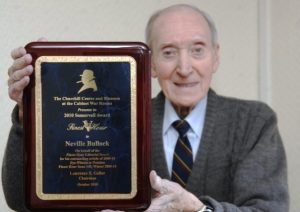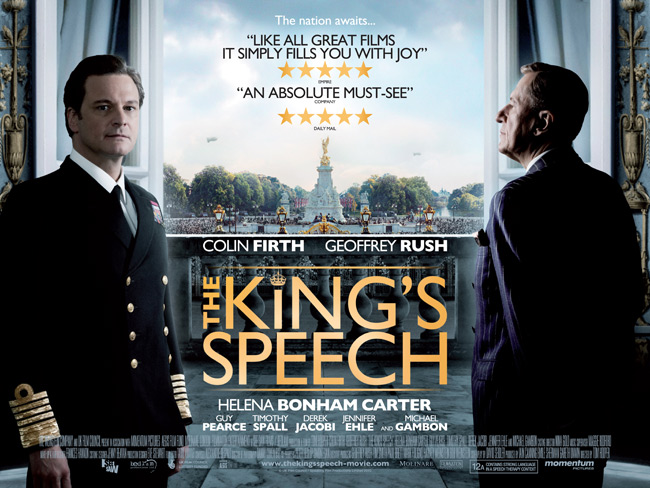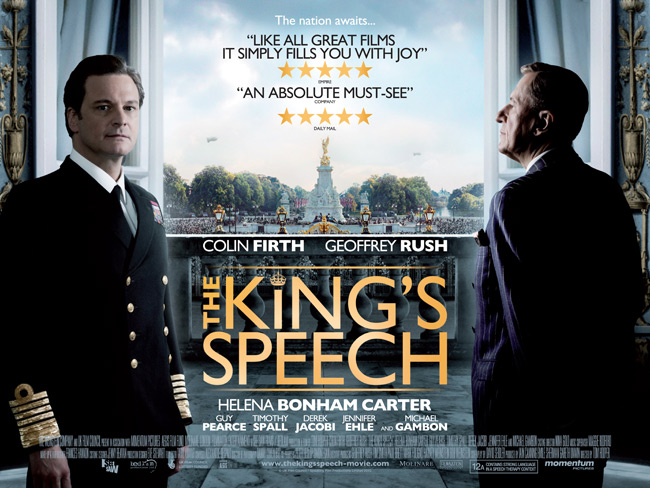
Bulletin #32 - Feb 2011
The King’s Speech

February 7, 2011
by David Freeman, for Finest Hour 150
On the last day of October, 1925 HRH Prince Albert, Duke of York, twenty-nine years old and second son of King George V, made his first broadcast speech. The occasion was the closing ceremony of the Empire Exhibition at Wembley Stadium. The Duke spoke into a microphone before a crowd of 100,000, but what often happened in private now happened in public: his words came haltingly, and he was acutely embarrassed. One man listening to the crowd that day, a speech therapist recently arrived from Australia, remarked, “He’s too old for me to manage a complete cure, but I could very nearly do it.”

2024 International Churchill Conference

One year later Lionel Logue had his chance. With the Duke and Duchess of York scheduled to make a Royal Tour of Australia, the need to improve the Duke’s speaking became pressing. Help had been sought before, never with success, but the Duke agreed to see Logue, a man with no medical training but strongly recommended.
The Duke and Logue hit it off from the start, and HRH left their very first meeting brimming with confidence. After two months of treatment, significant improvement in the Duke’s speech became evident and the Australian tour was a fine success.
For his part King George V was delighted. Although the King had verbally abused his children when they were young, he admired the adult “Bertie,” who rapidly became his favored son and preferred successor. But primogeniture was not to be questioned in those days, and so arose the 1936 Abdication Crisis.
Once Edward VIII had abdicated and the Duke of York had become King George VI, the new monarch’s was preoccupied by his coming performance during the Coronation and-even more daunting-the Empire-wide broadcast he must give later that day. Logue was called upon to assist, and success was again achieved.
Logue was habitually brought in to prepare the King for big speeches until the end of the Second World War. When the time came for his 1945 Christmas Day broadcast, however, George VI felt confident enough to manage on his own. Far from feeling discarded, Logue enjoyed the satisfaction of knowing his work was complete. “You know, Ma’am,” he said to Queen Elizabeth, “I feel like a father who is sending his boy to his first public school.” The Queen patted his arm and replied, “I know just how you feel.”
This compelling story is now dramatized in “The King’s Speech,” by screenwriter David Seidler, a Londoner whose own a childhood stammer led him to see George VI as a hero. In fine Shakespearean fashion, Seidler telescopes events and takes great liberties with the facts in order to tell a dramatic story in a reasonable amount of time. Most of the film centers upon the Abdication Crisis.
At the start George V is shown hectoring the fully-grown Bertie about being tongue-tied, causing the Duke to turn to Logue ten years later than he actually did. Significantly, as Andrew Roberts noted, Bertie’s stutter was never debilitating: “In fact it was relatively mild, and when he was concentrating hard on what he was saying it disappeared altogether.”
Roberts also noted that his brother never taunted Bertie for his stutter, or accuse him of wanting to usurp his throne….the ludicrous old lies about Joachim von Ribbentrop sending Wallis Windsor 17 red roses every day, and her working as a geisha in Shanghai, are trotted out to blacken her character and make the Yorks look better. Nor were the Duke and Duchess so pampered by courtiers that they could hardly work out how an elevator door worked.”
Additionally, the film fabricates a story about the Duke having to be “tricked” into trusting Logue, says that Logue was represented as a doctor, and that he used the Duke’s Christian name. And far from working in a ramshackle office as in the film, Logue had a smart set of rooms in Harley Street.
The film does faithfully depict Logue working with the new King in preparation for the Coronation, but omits the broadcast that followed. Instead the action fast-forwards to the start of the war, when George VI had to deliver another major broadcast to the Empire and called upon the faithful Logue for assistance, representing how the King prepared for all his broadcasts until the end of the war and the film’s climax.
Into this mix Winston Churchill is dropped rather gratuitously. Since all but the final scenes in the film take place during Churchill’s Wilderness Years of the 1930s, WSC’s screen-time is both brief and contrived. No doubt the point is to illustrate that George VI was the sovereign whom Churchill served during the war, and that the deportment of the King and Royal Family, in addition to Churchill’s speeches, helped keep up public morale. In any case, Timothy Spall manages to show enough character in his fleeting moments as Churchill to suggest that given the chance at a more expansive portrayal, he would do a splendid job.
Churchill is first shown disapprovingly waiting upon Edward VIII at Balmoral. He next appears privately suggesting to the Duke of York the use of George as regal cognomen instead of Albert, which “sounds too German.” There is no evidence that this idea originated with Churchill, but the moment serves to make it clear to the audience that “Bertie” became George VI.
Finally, Churchill appears in 1939, newly-installed as First Lord of the Admiralty, encouraging the King by saying he too once suffered from a speech impediment. In reality, Churchill never overcame his inability to pronounce the letter “s,” but the intention here is to convey that Churchill and his Sovereign had something in common. The scene in which Churchill, Chamberlain and the Archbishop of Canterbury attend the King’s war broadcast, as if they had nothing else to do, is just silly.
Planting explanatory lines however ahistoric in the mouths of characters is an acceptable practice in docu-drama. It helps move the story along. Still there is one true howler: Stanley Baldwin is shown submitting his resignation as prime minister in 1937 on the grounds that he had been quite wrong about Hitler while Churchill had been right, and announces the King that Chamberlain will succeed him.
In fact the supremely self-satisfied Baldwin retired for the sake of retiring, certain that Chamberlain would continue the policies then drawing the wrath of Churchill. It would be another two years at least before anyone conceded that Winston was right. And, of course, it is the Sovereign’s prerogative whom to send for as Prime Minister; even the smug Baldwin would not have mentioned Chamberlain unless the King asked, which he well might have for the sake of form. Both of them, after all, knew who the obvious successor was.
If The King’s Speech makes for better drama than it does history, it nevertheless succeeds in getting one thing absolutely right: it was the Duke’s wife, later Queen Elizabeth, who first encouraged him to see Logue, and who provided critical moral support. She even assisted in the therapy sessions herself, and provided her testimonial to Logue in a bittersweet footnote to history.
When in the 1950s the sad task fell to Queen Elizabeth, the Queen Mother of selecting her late-husband’s official biographer, she chose John Wheeler-Bennett. If Wheeler-Bennett wrote with particular sensitivity about the matter of the King’s speech, it no doubt stemmed from the fact that he was himself a former patient of Lionel Logue.
For a review of The King’s Speech by historian Andrew Roberts, follow this link.
Professor Freeman teaches history at the University of California Fullerton.
Subscribe
WANT MORE?
Get the Churchill Bulletin delivered to your inbox once a month.



